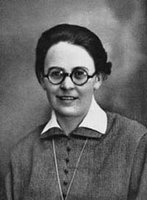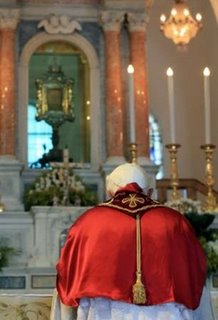
Our body is a vessel of corruption; it is meant for death and for the worms, nothing morel And yet we devote ourselves to satisfying it, rather than to enriching our soul, which is so great that we can conceive nothing greater-no, nothing, nothing! For we see that God, urged by the ardour of His charity, would not create us like the animals; He has created us in His own image and likeness, do you see? Oh, how great is man?
Man, being created by love, cannot live without love: either he loves God, or he loves himself and he loves the world. See, my children, it is faith that we want. . . . When we have not faith, we are blind. He who does not see, does not know; he who does not know does not love; he who does not love God loves himself, and at the same time loves his pleasures. He fixes his heart on things which pass away like smoke. He cannot know the truth, nor any good thing; he can know nothing but falsehood, because he has no light; he is in a mist. If he had light, he would see plainly that all that he loves can give him nothing but eternal death; it is a foretaste of Hell.
Do you see, my children, except God, nothing is solid--nothing, nothing! If it is life, it passes away; if it is a fortune, it crumbles away; if it is health, it is destroyed; if it is reputation, it is attacked. We are scattered like the wind. . . . Everything is passing away full speed, everything is going to ruin. O God! O God! how much those are to be pitied, then, who set their hearts on all these things! They set their hearts on them because they love themselves too much; but they do not love themselves with a reasonable love-they love themselves with a love that seeks themselves and the world, that seeks creatures more than God. That is the reason why they are never satisfied, never quiet; they are always uneasy, always tormented, always upset. See, my children, the good Christian runs his course in this world mounted on a fine triumphal chariot; this chariot is borne by angels, and conducted by Our Lord Himself, while the poor sinner is harnessed to the chariot of this life, and the devil who drives it forces him to go on with great strokes of the whip.
My children, the three acts of faith, hope and charity contain all the happiness of man upon the earth. By faith, we believe what God has promised us: we believe that we shall one day see Him, that we shall possess Him, that we shall be eternally happy with Him in Heaven. By hope, we expect the fulfilment of these promises: we hope that we shall be rewarded for all our good actions, for all our good thoughts, for all our good desires; for God takes into account even our good desires. What more do we want to make us happy?
In Heaven, faith and hope will exist no more, for the mist which obscures our reason will be dispelled; our mind will be able to understand the things that are hidden from it here below. We shall no longer hope for anything, because we shall have everything. We do not hope to acquire a treasure which we already possess. . . . But love; oh, we shall be inebriated with it! we shall be drowned, lost in that ocean of divine love, annihilated in that immense charity of the Heart of Jesus! so that charity is a foretaste of Heaven. Oh, how happy should we be if we knew how to understand it, to feel it, to taste it! What makes us unhappy is that we do not love God.
When we say, "My God, I believe, I believe firmly, " that is, without the least doubt, without the least hesitation. . . Oh, if we were penetrated with these words: "I firmly believe that Thou art present everywhere, that Thou seest me, that I am under Thine eyes, that one day I myself shall see Thee clearly, that I shall enjoy all the good things Thou hast promised me! O my God, I hope that Thou wilt reward me for all that I have done to please Thee! O my God, I love Thee; my heart is made to love Thee!" Oh, this act of faith, which is also an act of love, would suffice for everything! If we understood our own happiness in I being able to love God, we should remain motionless in ecstasy. . . .
If a prince, an emperor, were to cause one of his subjects to appear before him, and should say to him, "I wish to make you happy; stay with me, enjoy all my possessions, but be careful not to give me any just cause of displeasure, " with what care, with what ardour, would not that subject endeavour to satisfy his prince! Well, God makes the same proposals to us . . . and we do not care for His friendship, we make no account of His promises. . . . What a pity!
Read more on St. John Vianney
 Blessed Sara Salkahazi is scheduled to be beatified on September 17, 2006, at Budapest's St. Stephen Basilica. Salkahazi was a Hungarian nun that saved the lives of dozens of Jews during World War II. She is an example of the sacrificial love that Jesus calls us to show to the whole world.
Blessed Sara Salkahazi is scheduled to be beatified on September 17, 2006, at Budapest's St. Stephen Basilica. Salkahazi was a Hungarian nun that saved the lives of dozens of Jews during World War II. She is an example of the sacrificial love that Jesus calls us to show to the whole world.















